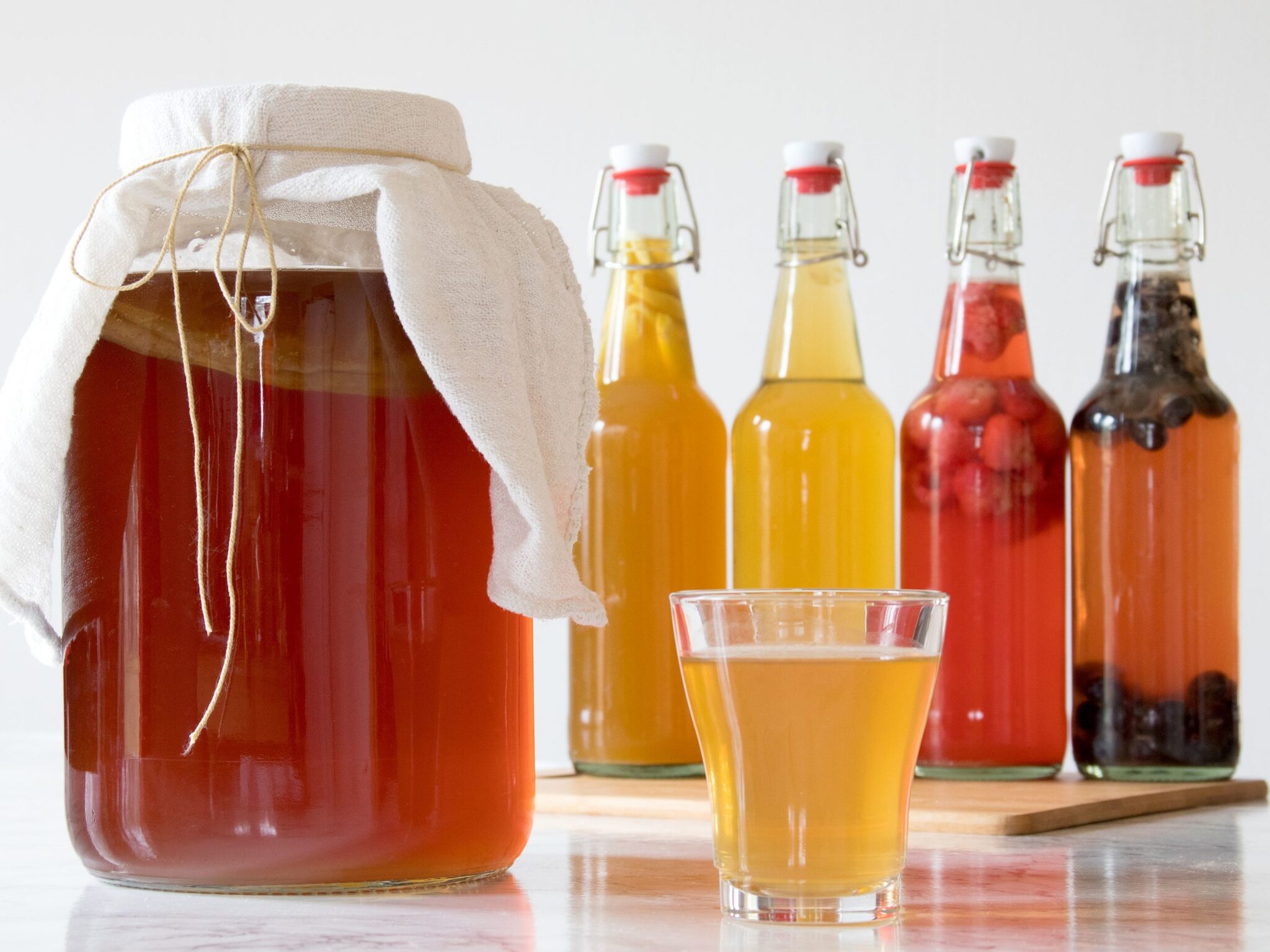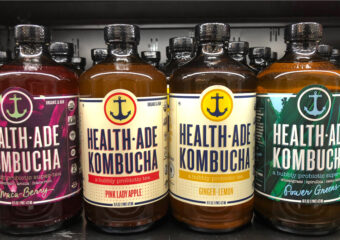Kombucha’s Alcohol Content – What You Need to Know
Kombucha, a fermented tea drink, has started gaining popularity in recent years for its health benefits and unique taste. But one question that often comes up is whether kombucha is alcoholic. The answer is not so simple, as the alcohol content in kombucha can vary depending on a number of factors.
Kombucha is produced by fermenting sweetened tea with a culture of yeast and bacteria, known as a SCOBY (symbiotic culture of bacteria and yeast). During the fermentation process, the yeast in the SCOBY consumes the sugar in the tea and produces alcohol and carbon dioxide. The bacteria then convert the alcohol into acetic acid, giving kombucha its tangy flavor.
While most kombuchas are non-alcoholic, they do contain a small amount of alcohol, usually less than 0.5%. However, factors such as the type of yeast and bacteria used, the temperature at which the kombucha is brewed, and the length of fermentation time can all influence the alcohol level in the final beverage.
Exploring the Alcohol Content in Kombucha
When it comes to kombucha, one of the most intriguing aspects is its alcohol content. Kombucha has gained popularity in recent years as a trendy and health-conscious beverage, but many people are still unsure about whether or not it is alcoholic. The answer is both yes and no.
Kombucha is a fermented drink made from sweetened tea that is mixed with a culture of yeast and bacteria. During the fermentation process, the yeast consumes the sugar in the tea and produces alcohol as a byproduct. This is a natural part of the fermentation process, and most kombucha will contain some level of alcohol. However, the amount of alcohol in kombucha is generally quite low, usually below 0.5% alcohol by volume.
The alcohol content in kombucha can vary depending on a number of factors, including the type of tea used, the length of fermentation, and the temperatures at which it is brewed. Some kombuchas may have higher alcohol levels if they are brewed for longer periods or at higher temperatures. However, most commercially available kombucha drinks have alcohol levels below the legal limit for non-alcoholic beverages.
It’s important to note that while kombucha may contain trace amounts of alcohol, it is not considered an alcoholic beverage. Most people can consume kombucha without any of the effects associated with drinking alcohol. For those who are concerned about the alcohol content in their kombucha, there are also alcohol-free versions available that have been specially brewed to have lower alcohol levels.
So, is kombucha alcoholic? The answer is yes, but only in very small amounts. For those who are looking to enjoy the health benefits of kombucha without the worry of consuming alcohol, there are plenty of options available on the market that have been specially brewed to have lower alcohol levels.
Factors Influencing Alcohol Levels in Kombucha Drinks
When it comes to making kombucha at home, one important question that many people have is: “Is kombucha alcoholic?” The short answer is yes, but the alcohol levels in homemade kombucha are generally very low and well below the legal limit for an alcoholic beverage. However, there are several factors that can influence the alcohol content in kombucha drinks, including the following:
1. Fermentation Time
The longer you ferment your kombucha, the higher the alcohol content will be. As the kombucha ferments, the yeast in the SCOBY (Symbiotic Culture Of Bacteria and Yeast) consumes the sugar in the tea and produces alcohol as a byproduct. Therefore, if you ferment your kombucha for a longer period of time, the alcohol levels will be higher.
2. Temperature
The temperature at which you ferment your kombucha can also affect the alcohol content. Higher temperatures generally result in higher alcohol levels, as the yeast is more active and produces more alcohol when it is warmer. Conversely, fermenting your kombucha at lower temperatures will result in lower alcohol levels.
| Factors | Influencing Alcohol Levels |
|---|---|
| Fermentation Time | Longer fermentation results in higher alcohol content. |
| Temperature | Higher temperatures lead to higher alcohol levels. |
While kombucha is naturally a fermented beverage, it is important to note that the alcohol content in most homemade kombucha drinks is very low and well below the legal limit for an alcoholic beverage. Therefore, you can safely consume homemade kombucha without worrying about getting drunk.
It is also worth mentioning that there are many other factors that can influence the alcohol content in kombucha, including the types and amounts of bacteria and yeast present, the type of tea used, and the sugar content in the brew. By controlling these factors and following proper recipes, you can ensure that your homemade kombucha remains a delicious and non-alcoholic beverage that is safe to drink.
Factors Influencing Alcohol Levels in Kombucha Drinks
When it comes to the alcohol content in kombucha drinks, there are several factors that can influence the final amount of alcohol produced. Understanding these factors is important for those who want to ensure that their kombucha stays below the legal limit of alcohol, which is typically around 0.5% ABV (alcohol by volume).
| 1. Fermentation Method: | The primary factor that influences the alcohol content in kombucha is the fermentation method used. Kombucha is typically made by fermenting sweet tea with a symbiotic culture of bacteria and yeast (SCOBY). The SCOBY consumes the sugar in the tea and produces alcohol as a byproduct. The longer the kombucha is left to ferment, the higher the alcohol content will be. |
| 2. Initial Sugar Content: | The amount of sugar initially added to the kombucha brew also plays a significant role in determining the final alcohol content. Higher amounts of sugar can result in higher alcohol levels, as the yeast has more sugar to ferment. Some people opt for sugar-free kombucha recipes to keep the alcohol content low. |
| 3. Fermentation Temperature: | The temperature at which the kombucha is fermented can impact the rate of alcohol production. Higher temperatures can promote faster fermentation and potentially higher alcohol levels. Conversely, lower temperatures may slow down the fermentation process and result in lower alcohol content. |
| 4. Acetic Acid Formation: | The presence of acetic acid, which gives kombucha its characteristic tangy flavor, can also affect the alcohol content. Acetic acid is produced during fermentation and can help moderate the alcohol levels in the drink. However, too much acetic acid can lead to a vinegar-like taste and potentially higher alcohol content. |
It’s important to note that while kombucha is a fermented beverage, it isn’t always alcoholic. Many commercial kombuchas are tested to ensure that they stay below the legal alcohol limit. People have been brewing and enjoying kombucha for thousands of years, and its popularity has only grown in recent years. Understanding the factors that influence alcohol levels in kombucha drinks can help ensure that everyone can enjoy this delicious and healthful drink. If you’re interested in making your own kombucha at home, be sure to follow recipes and guidelines carefully to exchange tips and contact with others who brew kombucha!
(Source: Kombucha: The One True Beverage, Reading Time: Hard To Say, including everyones contact mixed exchange)






